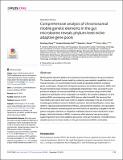| dc.contributor.author | Jiang, Xiaofang | |
| dc.contributor.author | Hall, Andrew Brantley | |
| dc.contributor.author | Xavier, Ramnik J. | |
| dc.contributor.author | Alm, Eric J. | |
| dc.date.accessioned | 2020-04-01T13:16:35Z | |
| dc.date.available | 2020-04-01T13:16:35Z | |
| dc.date.issued | 2019-12-12 | |
| dc.identifier.issn | 1932-6203 | |
| dc.identifier.uri | https://hdl.handle.net/1721.1/124471 | |
| dc.description.abstract | Mobile genetic elements (MGEs) drive extensive horizontal transfer in the gut microbiome. This transfer could benefit human health by conferring new metabolic capabilities to commensal microbes, or it could threaten human health by spreading antibiotic resistance genes to pathogens. Despite their biological importance and medical relevance, MGEs from the gut microbiome have not been systematically characterized. Here, we present a comprehensive analysis of chromosomal MGEs in the gut microbiome using a method that enables the identification of the mobilizable unit of MGEs. We curated a database of 5,219 putative MGEs encompassing seven MGE classes called ImmeDB. We observed that many MGEs carry genes that could confer an adaptive advantage to the gut environment including gene families involved in antibiotic resistance, bile salt detoxification, mucus degradation, capsular polysaccharide biosynthesis, polysaccharide utilization, and sporulation. We find that antibiotic resistance genes are more likely to be spread by conjugation via integrative conjugative elements or integrative mobilizable elements than transduction via prophages. Horizontal transfer of MGEs is extensive within phyla but rare across phyla, supporting phylum level niche-adaptive gene pools in the gut microbiome. ImmeDB will be a valuable resource for future studies on the gut microbiome and MGE communities. | en_US |
| dc.language.iso | en | |
| dc.publisher | Public Library of Science (PLoS) | en_US |
| dc.relation.isversionof | 10.1371/journal.pone.0223680 | en_US |
| dc.rights | Creative Commons Attribution 4.0 International license | en_US |
| dc.rights.uri | https://creativecommons.org/licenses/by/4.0/ | en_US |
| dc.source | PLoS | en_US |
| dc.subject | General Biochemistry, Genetics and Molecular Biology | en_US |
| dc.subject | General Agricultural and Biological Sciences | en_US |
| dc.subject | General Medicine | en_US |
| dc.title | Comprehensive analysis of chromosomal mobile genetic elements in the gut microbiome reveals phylum-level niche-adaptive gene pools | en_US |
| dc.type | Article | en_US |
| dc.identifier.citation | Jiang, Xiaofang et al. "Comprehensive analysis of chromosomal mobile genetic elements in the gut microbiome reveals phylum-level niche-adaptive gene pools." PLoS one 14 (2019):e0223680 © 2019 The Author(s) | en_US |
| dc.contributor.department | Massachusetts Institute of Technology. Department of Biological Engineering | en_US |
| dc.contributor.department | Massachusetts Institute of Technology. Department of Civil and Environmental Engineering | en_US |
| dc.contributor.department | Massachusetts Institute of Technology. Center for Microbiome Informatics and Therapeutics | |
| dc.relation.journal | PLoS one | en_US |
| dc.eprint.version | Final published version | en_US |
| dc.type.uri | http://purl.org/eprint/type/JournalArticle | en_US |
| eprint.status | http://purl.org/eprint/status/PeerReviewed | en_US |
| dc.date.updated | 2020-02-10T20:32:20Z | |
| atmire.cua.enabled | | |
| dspace.date.submission | 2020-02-10T20:32:23Z | |
| mit.journal.volume | 14 | en_US |
| mit.journal.issue | 12 | en_US |
| mit.license | PUBLISHER_CC | |
| mit.metadata.status | Complete | |
